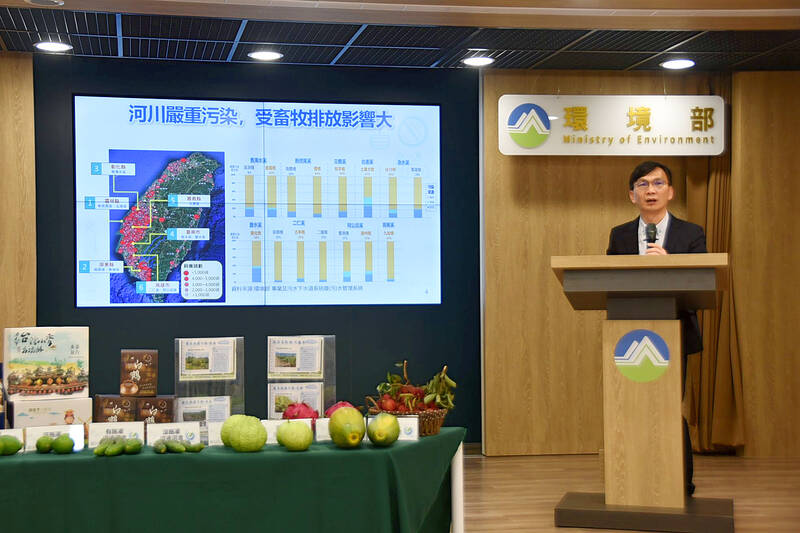The Ministry of Environment on Thursday urged the nation’s about 1,400 small-scale animal farm operators to step up their efforts in meeting the 5 percent target of wastewater recycling by the end of this year.
Husbandry wastewater remained the main source of river pollution last year, Department of Water Quality Protection Director-General Wang Yue-bin (王嶽斌) said.
Data from Kaohsiung’s Guting Bridge and Jiouru Bridge monitoring stations showed that up to 90 percent of river pollution at the two sites last year stemmed from husbandry wastewater, he said.

Photo: Wu Po-hsuan, Taipei Times
Husbandry wastewater used to be regulated by the Effluent Standards (放流水標準) and discharged into rivers following a three-stage wastewater treatment, he said.
As such, sewage discharge would inevitably contaminate river water, he said, adding that the ministry revised the Regulations Governing Water Pollution Control Measures and Test Reporting Management (水污染防治措施及檢測申報管理辦法), requiring farms to meet livestock wastewater recycling targets based on their size.
Farms with 20 to 2,000 pigs or 40 to 500 cattle are defined as “small-scale” farms, while those with more than 2,000 pigs or more than 500 cattle are defined as “large-scale” farms, according to the regulations.
Large-scale farms were required to have 5 percent of livestock wastewater recycled by the end of 2022 and reach another target of 10 percent by the end of 2027, Wang said.
Small-scale farms must reach the 5 percent target by the end of this year and the 10 percent target by the end of 2029, he said, adding that those who fail to meet the targets would be fined up to NT$6 million (US$205,620) in accordance with Article 46 of the regulations.
Data showed that 3,902 of 5,334 animal farms nationwide have reached the 5 percent target as of this month, accounting for 73 percent, he said.
While large-scale farms have all achieved their 5 percent target, the achievement rate of small-scale farms was 70 percent, he said.
Pingtung and Yunlin counties — two major pig farming areas — still have more than 300 farms that have not met the target, he added.
Livestock excrement recycled as digestate can be used as nitrogen fertilizer, and the method has been applied to at least 133 agricultural crops nationwide, he said.
The ministry last year also collaborated with Taiwan Sugar Co (Taisugar) and the Pingtung County Environmental Protection Bureau in using digestate to fertilize woodlands, Wang said.
An energy-saving, non-electric fertilization system leveraging the gravity flow to distribute the fertilizer was developed through the collaboration, he added.
Trees fertilized with digestate grew well and had no unusual smell, Wang said, adding that the woodlands’ groundwater tested normal.
The biogas was also utilized as a green energy source and could generate up to 1.861 megawatt-hours of electricity per year, he said.
It also helped reduce 85,000 tonnes of carbon emissions and 95,000 bags of artificial fertilizer, he added.
To promote the development and applications of sustainable environmental governance technologies, the ministry would establish a certification system for emerging energy and resource recovery techniques, as well as an incentive program for biogas power generation by husbandry operators by the end of next month, he said.

The manufacture of the remaining 28 M1A2T Abrams tanks Taiwan purchased from the US has recently been completed, and they are expected to be delivered within the next one to two months, a source said yesterday. The Ministry of National Defense is arranging cargo ships to transport the tanks to Taiwan as soon as possible, said the source, who is familiar with the matter. The estimated arrival time ranges from late this month to early next month, the source said. The 28 Abrams tanks make up the third and final batch of a total of 108 tanks, valued at about NT$40.5 billion

Two Taiwanese prosecutors were questioned by Chinese security personnel at their hotel during a trip to China’s Henan Province this month, the Mainland Affairs Council (MAC) said yesterday. The officers had personal information on the prosecutors, including “when they were assigned to their posts, their work locations and job titles,” MAC Deputy Minister and spokesman Liang Wen-chieh (梁文傑) said. On top of asking about their agencies and positions, the officers also questioned the prosecutors about the Cross-Strait Joint Crime-Fighting and Judicial Mutual Assistance Agreement, a pact that serves as the framework for Taiwan-China cooperation on combating crime and providing judicial assistance, Liang

A group from the Taiwanese Designers in Australia association yesterday represented Taiwan at the Midsumma Pride March in Melbourne. The march, held in the St. Kilda suburb, is the city’s largest LGBTQIA+ parade and the flagship event of the annual Midsumma Festival. It attracted more than 45,000 spectators who supported the 400 groups and 10,000 marchers that participated this year, the association said. Taiwanese Designers said they organized a team to march for Taiwan this year, joining politicians, government agencies, professionals and community organizations in showing support for LGBTQIA+ people and diverse communities. As the first country in Asia to legalize same-sex

MOTIVES QUESTIONED The PLA considers Xi’s policies toward Taiwan to be driven by personal considerations rather than military assessment, the Epoch Times reports Chinese President Xi Jinping’s (習近平) latest purge of the Chinese People’s Liberation Army (PLA) leadership might have been prompted by the military’s opposition to plans of invading Taiwan, the Epoch Times said. The Chinese military opposes waging war against Taiwan by a large consensus, putting it at odds with Xi’s vision, the Falun Gong-affiliated daily said in a report on Thursday, citing anonymous sources with insight into the PLA’s inner workings. The opposition is not the opinion of a few generals, but a widely shared view among the PLA cadre, the Epoch Times cited them as saying. “Chinese forces know full well that